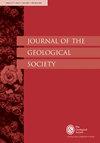Detrital zircon U–Pb and Hf analyses of Silurian–Devonian sediments in the Sukhothai Terrane, northern Thailand: Implications for the middle Paleozoic arc belt
IF 3
3区 地球科学
Q2 GEOSCIENCES, MULTIDISCIPLINARY
引用次数: 0
Abstract
The Sukhothai Terrane in northern Thailand comprises a continental basement and a Permo-Triassic magmatic arc related to the subduction of the main Paleo-Tethys Ocean. The Donchai Group represents the oldest sedimentary sequence of the Sukhothai Terrane and consists mainly of meta-sandstone, quartzo-feldspathic schist, phyllite and silty slate. This paper presents new detrital zircon U–Pb geochronology and Lu–Hf isotope data, and geochemical results for the sedimentary rocks of the Donchai Group to elucidate the depositional age, provenance and nature of the group. The youngest detrital zircon ages (433–403 Ma) suggest that the Donchai Group was accumulated between 433 Ma and 368 Ma, revealing Silurian–Devonian arc magmatic rocks on the western margin of the Sukhothai Terrane. Sediments of the Donchai Group were sourced from both the continental basement and a Silurian–Early Devonian magmatic arc, suggesting a depositional setting on the continental slope of a back-arc basin along the western flank of the Sukhothai Terrane. The Silurian–Devonian arc belt in SW China likely extend to the Chiang Rai region, to the west of the Sukhothai Terrane, northern Thailand, revealing the northward subduction of the Proto-Tethys Ocean along the western Simao and Sukhothai margin during the middle Paleozoic. The inferred arc and back-arc configuration of the Proto-Tethys in northern Thailand is comparable with that recently established in Yunnan, SW China. Supplementary material: https://doi.org/10.6084/m9.figshare.c.6858373泰国北部素可泰地体志留系-泥盆系碎屑锆石U-Pb和Hf分析:对中古生代弧带的启示
泰国北部素可泰地体由大陆基底和二叠纪-三叠纪岩浆弧组成,该岩浆弧与古特提斯洋的俯冲有关。东柴组是素可泰地体最古老的沉积序列,主要由变质砂岩、石英长石片岩、千层岩和粉砂质板岩组成。本文介绍了新的碎屑锆石U-Pb年代学和Lu-Hf同位素数据,以及东柴群沉积岩的地球化学结果,阐明了东柴群的沉积时代、物源和性质。最年轻的碎屑锆石年龄(433 ~ 403 Ma)表明东柴群在433 ~ 368 Ma之间形成,显示素可泰地体西缘志留系—泥盆系弧岩浆岩。东柴群的沉积物既来自大陆基底,也来自志留纪—早泥盆世岩浆弧,表明其沉积环境位于素可泰地体西翼弧后盆地的大陆斜坡上。中国西南部志留纪-泥盆纪弧带可能延伸至泰国北部素可泰地体以西的清莱地区,揭示了中古生代原特提斯洋沿西思茅和素可泰边缘向北俯冲。在泰国北部推断出的原特提斯构造的弧和弧后构造与最近在中国云南建立的构造相似。补充资料:https://doi.org/10.6084/m9.figshare.c.6858373
本文章由计算机程序翻译,如有差异,请以英文原文为准。
求助全文
约1分钟内获得全文
求助全文
来源期刊

Journal of the Geological Society
地学-地球科学综合
CiteScore
6.00
自引率
3.70%
发文量
68
审稿时长
6-12 weeks
期刊介绍:
Journal of the Geological Society (JGS) is owned and published by the Geological Society of London.
JGS publishes topical, high-quality recent research across the full range of Earth Sciences. Papers are interdisciplinary in nature and emphasize the development of an understanding of fundamental geological processes. Broad interest articles that refer to regional studies, but which extend beyond their geographical context are also welcomed.
Each year JGS presents the ‘JGS Early Career Award'' for papers published in the journal, which rewards the writing of well-written, exciting papers from early career geologists.
The journal publishes research and invited review articles, discussion papers and thematic sets.
 求助内容:
求助内容: 应助结果提醒方式:
应助结果提醒方式:


